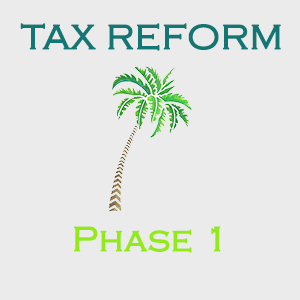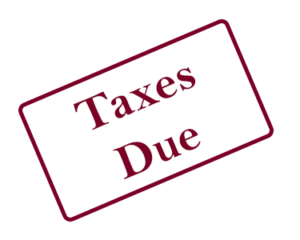The Tax Department has recently introduced part 2 of their tax relief measures to help restore the Aruban Economy which is still suffering from the COVID-19 pandemic. These measures will be applied starting November 1, 2020. Below you can find some of the most important tax relief measures.
1) Expansion and increase of investment credit
For the years 2020, 2021 and 2022, the investment credit percentage as described in the national ordinance income tax and profits tax, has been increased from 6% to 10%. When the investment is sold within 6 six years, the same percentage will need to be added to the taxable profit (divestment penalty).
Additionally, not only assets bought from a local supplier qualify for investment credit but also those assets bought directly from foreign suppliers qualify for investment credit.
2) Increasing maximum revenue threshold of the Small Business Regulation
Currently, small business owners (natural persons / sole-proprietorships) who can prove that they have annual revenues of Awg. 12,000 or less can apply for the Small Business Regulation which entails that these businesses can be exempted from paying BBO/BAZV/BAVP. To stimulate start ups and small businesses, the maximum revenue threshold has been increased to Awg. 84,000 annually starting in the year 2021. Small business owners need to apply for this facility at the tax department.
3) Additional deductibles for Promising Sector startups
Companies that exist since January 1, 2017 and that are registered at the Chamber of Commerce, the Tax Department and the Social Insurance Bank (SVB) may deduct 50% of the principal of their loans in the years 2020, 2021 and 2022 up to a maximum of Awg. 30,000 per calendar year for profits tax purposes. The following conditions apply:
- The above mentioned loan must have been contracted in 2020.
- The activities of the company must be in one of the six promising sectors as described here by the Department of Economic Affairs, Trade & Industry.
Promising sectors:
- Tourism: Culture tourism, sports tourism, adventure tourism, medical tourism.
- Knowledge economy: Solar energy, ocean technology, higher education, ICT, island based solutions as expert.
- Logistics: Maritime services, airline services, port hub (FZ), high value goods storage, tugboat.
- Agriculture: Local organic food production.
- Circular economy: Waste to energy, seawater industries, reuse of waste.
- Creative industries: Art and music, graphic design, photography, web-design, art studio, fashion.
4) Expanding of the beneficial policy regarding savings and thrift funds
With regard to the amount saved in a savings and thrift fund, it is approved by means of a beneficial policy that employees may withdraw the saved amount untaxed during 2020 and 2021, even though these amounts have not yet been in the savings account for four years. This also applies in the event of a voluntary or involuntary redundancy scheme resulting in the termination of employment.
5) Additional deductibility for education and training expenses
To stimulate retraining of the work force, companies may now deduct an additional 200% of education and training expenses of their employees. Normally, these expenses were already 100% deductible, however, now they are 300% deductible.
Companies can now also reimburse education and training expenses that are necessary for the performance of the relevant position and / or profession of their employees, tax free to their employees. Both online and physical training qualify.
Exceptions
Travel and lodging expenses to and from the foreign training location as well as food and beverage expenses are excepted form this regulation since these are already reimbursed tax free to the employees based on the General regulations for tax-free expense allowances (AB 2007 no. 114).
6) Additional deductibility for marketing and promotional expenses
Companies can deduct an additional 100% (up to a maximum of Awg. 30,000) for marketing and promotional expenses in the years 2020, 2021 and 2022. These expenses were already 100% deductible for tax calculation purposes. With this regulation, they are now 200% deductible. Actual invoices for marketing and promotional expenses must form part of the administration in accordance with the General National Tax Ordinance and can be audited by the tax authorities.
7) Expanding the possibility to compensate losses with 2 more years
The current period allowed to compensate losses is expanded with two (2) years to a total of seven (7) years for fiscal losses incurred in the years 2020, 2021 and 2022.
8) Abolition of Special tax on rental cars and rental motorcycles (BBVAM)
As a beneficial policy and in anticipation of the future elimination of the National Ordinance special tax on rental cars and rental motorcycles (BBVAM), license holders or authorized representatives are no longer require to pay this tax as of the 4th quarter of 2020. However, based on the current legislation and regulations, the license holders or authorized representatives are required to file a nil declaration for the last quarter of 2020 and overdue taxes and / or fines must have been paid off.
9) More flexible payment schedules
Businesses, individuals and retirees-non-entrepreneurs will have easier access to new flexible payment schemes in 2020 and 2021 (read: COVID and Post-COVID calendar years) for assessments already imposed, interest, dunning costs and other costs with regard to all tax assessments and non-tax assessments such as social insurance premiums (AOV/AWW and AZV) and land lease charges.
The new flexible payment plans for businesses do not apply to monthly tax resources for which taxpayers have been given additional time under the emergency tax plan to pay the tax due for the months of April, May and June 2020.
The new flexible payment schemes are as follows:
- Businesses have the choice to pay in 3, 6 or 12 months with a minimum of Awg. 500 per month
- Individual taxpayers have the choice to pay in 6, 12 or 18 months with a minimum of Awg. 100 per month
- Retirees-non-entrepreneurs have the choice to pay in 12, 18 or 24 months with a minimum of Awg. 75 per month
10) Remediation policy
Based on the remediation policy, taxpayers can appeal to a payment discount of 30% when effecting one-time payments of outstanding old (tax) debts.
Considerations:
- The remediation policy applies until June 30, 2021.
- A taxpayer who does not wish to make use of the remediation policy must otherwise come to a payment arrangement for the outstanding tax liabilities before July 1, 2021.
- The compulsory collection process with regard to defaulters will then be managed in a very strict manner, in accordance with the adjusted compliance program of the tax department.
Conditions for the application of the remediation policy:
- The remediation policy applies to all personal and business taxes with the exception of (i) the real estate tax, (ii) land lease charges, (iii) wage tax, (iv) social insurance premiums, (v) motor vehicle tax and (vi) assessments for which a settlement agreement has already been concluded between the tax payer and the tax department.
- The remediation policy applies to all assessments with a date of December 31, 2019 and older.
- A taxpayer who has entered into a payment arrangement or has been granted a postponement of payment in connection with an objection may also request application of the remediation policy.
- When paying tax assessments with a date of December 31, 2019 and older, a payment discount of 30% will be applied to discharge the outstanding and overdue (tax) debts.
- The relevant payment must relate to all outstanding (formal) tax debts up to and including December 31, 2019 that are outstanding in the name of the tax payer in the financial administration of the tax department and must be made in the context of restructuring.
- Payment must be made to the tax department no later than one (1) month after signing the request for remediation.
- The taxpayer will waive his right to lodge an objection and / or appeal against the tax assessments for which the restructuring has been granted, insofar as this has not already been used before.
- Objections and appeals already filed against the assessments for which the payment discount will be granted, will be deemed to have been withdrawn when the remediation agreement is concluded.
- It is a one-time offer. It is not possible to wait for objection, appeal or expiration requests in order to make use of this remediation policy.
- Current objections, appeals or expiration requests will lapse if use is made of the remediation policy.
- Any tax overpayment and / or refund will not be paid out to the taxpayer, but will be offset against the outstanding debt for which the remediation has been requested.
- The taxpayer must meet his current tax obligations (read: declaration and payment obligations) from the date of the signed remediation agreement.
11) Continuation of reduced income tax rate on dividends
As of January 1, 2019, by way of a beneficial policy, the rate for dividends distributed during the tax year 2019 was reduced to 10%, provided the conditions set were met (1). This policy announcement of the rate reduction for distributed dividends has also been continued for the 2020 tax year (2).
For the purposes of this policy, dividend is also understood to mean: a profit distribution originating from an entity established outside Aruba with a capital divided into shares, insofar as this is charged to a profit reserve present in the company that has been accumulated in the financial years ending no later than December 31, 2019 and which is paid to the shareholder, resident of Aruba during the calendar year 2020, 2021 and 2022.
No 10% dividend tax is payable in Aruba for dividend payments from entities established outside Aruba. This is the reason why the tax department should be informed of this in writing of such a dividend payment, so that they are able to impose a provisional income tax assessment for the relevant tax year on short term. The aforementioned notification requirement applies to dividends paid out in the 2020 financial year and beyond.
(1) See edition no. 4 volume: 2019 of the National Gazette of Aruba dated 15 February 2019 p. 10-12.
(2) See edition no. 26 volume: 2019 of the National Gazette of Aruba dated 20 December 2019 p. 23-25.
Final note
Please follow this link for a complete list on the tax department’s tax relief measures page.




